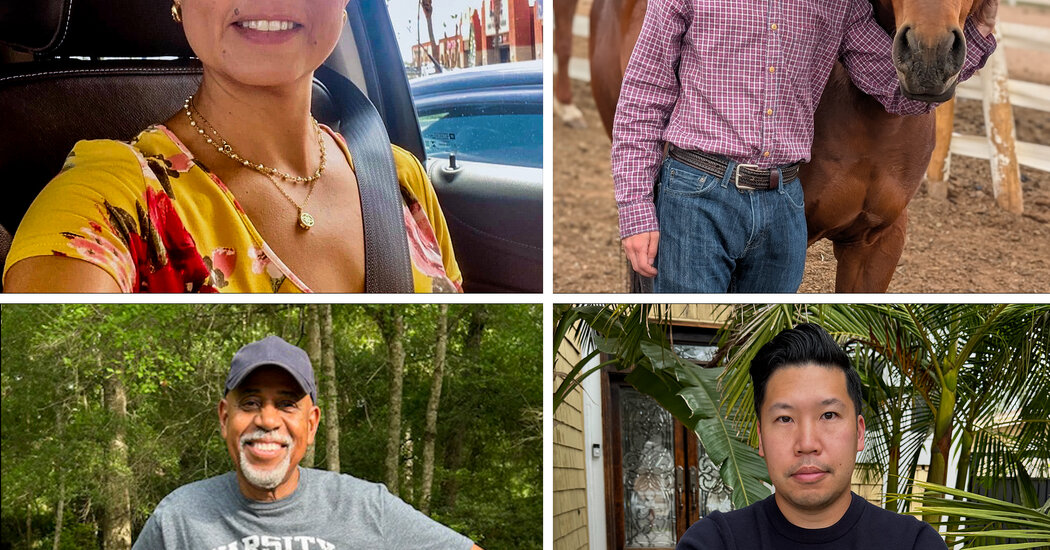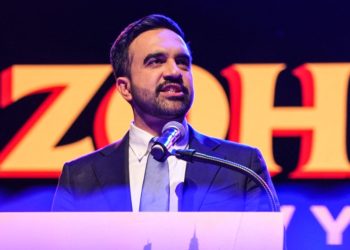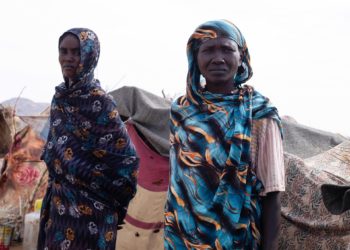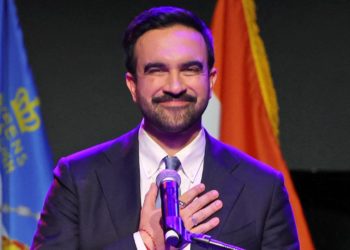What makes Americans proud of their country?
For Independence Day, The New York Times asked voters what they valued about the United States, as well as what worried them. While there were vast, often bitter, political divides, these voters also circled around some foundational American principles.
They talked about the privilege of speaking freely, casting a ballot for a candidate they believed in, and marching in a festive protest. Traveling to other countries heightened America’s virtues.
They also celebrated American life: Throwing a party on the beach. Buying a first home. And getting a second chance.
‘It’s honestly sort of beautiful that we have the freedom to make our own stupid choices.’
Charles Vaughters, 24, Laramie, Wyo., voted for Trump.
Growing up, Charles Vaughters had a Fourth of July tradition with one of his grandfathers: Together, they would read the Declaration of Independence aloud.
“I think it’s important — regardless of what America’s done right or what America has done wrong — to remind ourselves about the real core values of this country,” said Mr. Vaughters, a history major at the University of Wyoming, who keeps a copy of the Declaration of Independence on his desk.
“We have the freedom and opportunities to make something of ourselves,” he said. “We can make our own decisions and give our opinions. We can stand up for what we believe is right.”
He added, “It’s honestly sort of beautiful that we have the freedom to make our own stupid choices if we wanted to.”
Mr. Vaughters explained that in high school he was a poor student who was accepted into only one college — “and it was a bad one,” he recalled. Joining the Marine Corps helped him develop a good work ethic, and in his nearly four years there, he transformed himself. He’s now a 4.0 student, he said, and he appreciates that the United States gave him a do-over when, he said, some other countries wouldn’t have.
It bothers Mr. Vaughters that many in his generation don’t feel similar pride. He attributes part of that lack to what’s being taught in schools. In his recent class on the history of the West, he said the curriculum focused heavily on the dark part of that past, he said, like the treatment of Native Americans. That was awful, he said, but the class also glossed over anything good.
“I think it’s an overcorrection,” he said. “It’s a dangerous thing to have the next generation not even wanting to fix the country because they don’t love it.”
— Juliet Macur
At the beach, ‘there’s people of different walks of life, different cultures, and it’s super nice to just walk around.’
Thien Doan, 36, Orange, Calif., voted for Harris.
Every Fourth of July, Thien Doan spends the day on the beach with about two dozen friends spanning three generations. Children play in the sand while adults play cards, all dressed in red, white and blue. They surf. Toss footballs. And hot dogs, burgers and apple pies share the table with Japanese fried chicken and spam musubi rice balls.
“There’s people of different walks of life, different cultures, and it’s super nice to just walk around, because people are so friendly,” Mr. Doan, a software engineer, said.
He recalled once asking to borrow a lighter from a family grilling carne asada at the next firepit. They gave him the lighter, as well as a taco.
“There would always be a sense of community that I really love,” he said. “And that gave me a sense of pride of being in America.”
But the place that gives Mr. Doan such pride in his country also brings him deep concern. To reach the shore in Huntington Beach, Mr. Doan said that he and his friends must cross a bike path that has attracted a band of Trump supporters who wave Confederate and MAGA flags.
“They would just be yelling slurs at us, like: ‘Get out of the beach! Go back to China!’” said Mr. Doan, who is Vietnamese American.
“Seeing stuff like that,” he added, “it does give me more concern about where the country is going.”
— Laurel Rosenhall
‘Knowing your father is part of a world-changing event — I think that is a bit of an emotional thing for me.’
Randy Dutton, 68, Grays Harbor County, Wash., voted for Trump in 2024.
When Robert Randall Dutton, a retired Navy commander, was asked to recount a moment he felt proud of his country, he said his mind immediately went to his father. He was an aerospace engineer who worked on the Apollo space program. Mr. Dutton, who goes by Randy, was 12 in 1969 when he watched the moon landing on television. He knew the whole world was watching. He felt tremendously proud then, and he still does.
“Knowing your father is part of a world-changing event” — he went quiet for a moment — “I think that is a bit of an emotional thing for me.”
The memory also contained sadness. His father died from liver cancer when he was still in his 40s, after a doctor prescribed low doses of arsenic for a skin allergy. His father took arsenic for years. Randy said that when his father got a blood test to marry Randy’s mother, he learned that he had toxic levels of arsenic in his body and probably had only 15 more years to live. He died at 46.
That searing experience made Mr. Dutton alert to the potential dangers of chemical exposure — which relates to one of his disappointments. Some years ago, he worked for a company that did industrial shrink-wrapping, for products like boats and airplane parts. At some point, workers began feeling sick after handling the wrapping, and Mr. Dutton began researching the chemicals. He persuaded his company to stop using it, and tried to make a broader public case. He failed, because of what he believed were powerful business and political interests opposing him.
He added, “It’s a disappointment when I see vested interests trying to overrule public safety.”
— Sabrina Tavernise
Going to a protest felt ‘almost like a Fourth of July parade.’
Sam Consiglio, 22, Waukesha, Wis., voted for Harris.
Sam Consiglio’s first protest march was a revelation.
“I grew up in Waukesha,” Ms. Consiglio said, referring to her conservative hometown in Wisconsin. “It’s nothing like Chicago or New York, where you see large protests.”
Yet taking part in the No Kings demonstration against Donald Trump filled her with a particular kind of American pride.
The protest in June jammed the streets and sidewalks of her normally quiet community. Veterans shared stories, American flags filled the air, while music, chants and speeches created an atmosphere that felt “almost like a Fourth of July parade.”
“Our country is built on voices and built on people’s opinions,” she said. “Seeing that in action is really cool.”
The march contrasted sharply with Ms. Consiglio’s significant worry about American life: the normalization of persistent problems. Gun violence in schools stands out, she said. Ms. Consiglio, who recently graduated from the University of Wisconsin-Eau Claire, is part of a generation that grew up practicing lockdown drills.
Tragedies like school shootings, she lamented, are met with intense public attention and outcry, only for the momentum to wither without meaningful solutions. “It becomes this thing that’s unfortunately normalized in our society,” she said. “That’s a big concern.”
— Kurt Streeter
Voting ‘changed something in me. I felt like my voice was heard.’
Tanya Wright, 45, Yuma, Ariz., voted for Trump.
Tanya Wright became a citizen about a decade ago. But it wasn’t until a few months later, when she cast her first vote in the 2016 election, that she felt truly American.
Ms. Wright, a die-hard Republican who runs online businesses, voted for President Trump in the general election. It was a history-making election, and she felt proud that she had played a part in it.
“It changed something in me,” she said. “I felt like my voice was heard.”
Ms. Wright was born in Mexico and went back and forth between there and the United States for years, as a tourist and for college. She settled in Southern Arizona after meeting her husband, a retired military parachute instructor. She said she had been content living as a permanent resident until former President Barack Obama’s election, when she began to feel as if she did not have a say in the direction of the country.
She and her husband and their two sons, 13 and 15, share a star-spangled pride in their country under Mr. Trump. They watched his military parade in Washington from afar, and Ms. Wright said she felt as if he had put the country back on track.
She said she was not an in-your-face MAGA supporter, and did not wear the merchandise and hats. She said she felt troubled by how politicized many personal interactions now felt. When she talks about home-schooling her sons, she braces for a debate about vouchers and public-school funding.
“I’m just a live-and-let-live type of person,” she said. “I’m not one to be shoving my values or thoughts down people’s throats.”
— Jack Healy
‘I can express myself without fear.’
Clifford Eugene, 74, Lacombe, La., voted for Harris.
Clifford Eugene and his wife, Pam, took a cruise in the spring to Central and South America, a 15-day trip that would come to crystallize much of what he loves about the United States. While the boat was docked in port cities, the couple went on several tours to learn about each region’s history and culture and to spend time with the community. A theme began to emerge: Not everyone feels truly free.
Tour guides and residents told him that people sometimes cannot criticize their government and policies for fear of retribution.
“It wasn’t that they were not allowed by law, it was that it felt like a risk,” said Mr. Eugene, 74, a retired bank examiner for the Treasury Department. “I can express myself without fear. That is the kind of freedom that makes me proud to be American.”
At the same time, Mr. Eugene said he is disturbed by the treatment of Black people in the United States. This year, he said, has felt especially fraught, with the Trump administration’s efforts to purge diversity, equity and inclusion initiatives as well as minimize or erase some Black history.
“I am talking about the elimination or restriction of Black History books,” Mr. Eugene said. “People might be uncomfortable with Black history, but it’s American history.”
— Audra D. S. Burch
‘For the most part, I feel safe, and I feel like I am achieving my goals.’
Adria Laboy, 43, in the Poconos of Pennsylvania, voted for Harris.
Adria Laboy is proud to live in the United States. It’s a country that emphasizes freedom, she said, and has enabled her to achieve her dream of owning a home.
In 2009, Ms. Laboy, who works in health care community outreach, purchased her home in the Poconos region of Pennsylvania after years of saving.
“When I see everything that’s going around the world, I’m so blessed to live here in this country,” she said. “Although we have our own challenges, for the most part, I feel safe, and I feel like I am achieving my goals, and my kids will hopefully achieve theirs.”
But after the Supreme Court decided to overturn Roe v. Wade, she worried that the laws around pregnancy and abortion would become confusing. She decided to get her tubes tied to prevent a high-risk pregnancy.
She said, “The fact that I couldn’t make a decision for myself — that was a concern for me.”
— Christina Morales
The post 7 Voters on What They Love About America appeared first on New York Times.




